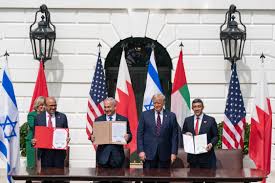
Introduction: The Significance of the Abraham Accords
The Abraham Accords, signed in September 2020, marked a pivotal moment in Middle Eastern diplomacy. Initiated by the United States, these agreements established formal relations between Israel and several Arab nations, primarily the United Arab Emirates and Bahrain. They represent a significant shift in a region long defined by conflict, highlighting the potential for cooperation over longstanding grievances. As the world grapples with the changing geopolitical landscape, understanding the implications of these accords remains essential.
The Details of the Accords
The Abraham Accords were officially unveiled on September 15, 2020, on the South Lawn of the White House, with representatives from Israel, the UAE, and Bahrain participating in the historic signing ceremony. With the signing of these accords, the UAE and Bahrain recognized Israel, opening avenues for economic, cultural, and diplomatic ties. Subsequent agreements have also been ventured with Sudan and Morocco, further expanding the $100 billion trade opportunities and fostering collaboration in technology, commerce, and tourism.
Current Developments and Events
As of late 2023, the Abraham Accords continue to influence political dynamics in the Middle East. Recently, there have been discussions regarding more Arab nations potentially joining the Accords, indicating a growing willingness among governments to engage with Israel. This momentum has also ushered in various initiatives aimed at enhancing security cooperation, counteracting Iran’s regional influence, and addressing shared challenges, such as climate change and economic stability. Notably, the Israeli and UAE governments have recently announced joint projects focused on renewable energy and technological innovation, underscoring their commitment to cooperation.
Conclusion: The Future of the Abraham Accords
The Abraham Accords represent more than just a series of agreements; they signify a transformative approach toward peace and cooperation in the Middle East. As further Arab nations consider normalizing relations with Israel, the potential for increased stability and prosperity in the region becomes ever more tangible. However, challenges remain, particularly regarding the Israeli-Palestinian conflict, which continues to be a sensitive and contentious issue. The future of the Accords will likely depend on the progress made toward addressing these challenges while maintaining the collaborative spirit that they embody.



